Do Small Businesses Understand SEO Best Practices in 2019?

Do Small Businesses Understand SEO Best Practices in 2019?
Nearly 80% of business with SEO strategies are confident they understand SEO best practices and most rely on in-house staff for their SEO strategies.
The number of small businesses that organize and execute SEO strategies will increase in 2019.
But how well do small businesses understand SEO?
The Manifest surveyed 529 small businesses about their SEO strategies and priorities to determine how well they comprehend and value SEO.
We define small businesses as having limited revenue and between 1 and 500 employees, which corresponds to the Small Business Administration's definition of small business.
We found that small businesses with SEO strategies are confident in their understanding of SEO best practices, a claim that is somewhat unfounded based on the resources they rely on and activities they include in their SEO strategies.
Small businesses should use this report to examine their understanding of SEO and determine if the resources they rely on for their SEO strategies are sufficient.
Our Findings
- More than one-third (36%) of small businesses have an SEO strategy. An additional 23% plan to create an SEO strategy in 2019, indicating small businesses realize the long-term value of SEO.
- Nearly 80% of small businesses with an SEO strategy are confident in their understanding of SEO best practices, compared to only 5% that are not confident.
- Fewer than half of small businesses include local search optimization (45%) or on-site optimization (40%) in their SEO strategies. Rather, social media marketing (63%) is the leading SEO activity among small businesses.
- More than half of small businesses (54%) rely on in-house staff for their SEO. Only 28% hire an SEO company to manage their SEO strategies.
- Small businesses that use an SEO agency include more services in their SEO strategies compared to those that rely on in-house staff. Half or more of small businesses that hire an SEO agency include content marketing (56%), on-site optimization (54%), keyword research (54%), and local search optimization (50%) as part of their SEO strategies.
- More than three-fourths of small businesses (77%) that partner with an SEO agency invest in PPC advertising.
Small Businesses Implement SEO Strategies for Long-Term Success
When small businesses invest in an SEO strategy, they set themselves up for long-term success.
Only 36% of small businesses currently have an SEO strategy in place.

An additional 23% of small businesses plan to organize and execute SEO strategies in 2019.
SEO is a long-term investment: It takes time for small businesses to build and optimize their website content and to rank in search engines for certain terms.
According to Andrew King, search analyst for Klood, a digital marketing agency in the United Kingdom, a successful long-term SEO strategy includes:
- Clear goals
- Long- and short-term objectives
- Well-allocated resources
“Businesses without a long-term SEO strategy trend toward using short-term solutions, which leads to fewer organic gains in the long run rather than thinking of the bigger, long-term picture,” King said.
SEO strategies should entail long-term goal-setting and planning that help small businesses achieve organic SEO success in the future.
Small Businesses Are Confident They Understand SEO Best Practices
Having an SEO strategy lends confidence to small businesses’ understanding of SEO.
Nearly 80% of small businesses with an SEO strategy are confident they understand SEO best practices.
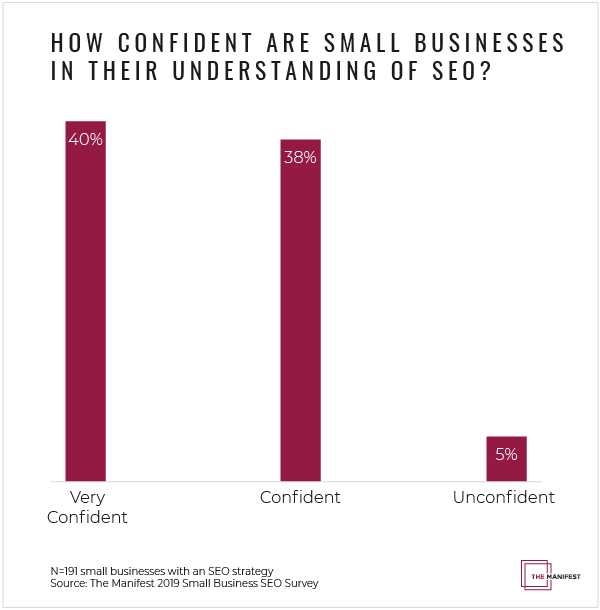
Only 5% of small businesses with an SEO strategy are not confident about their understanding of SEO best practices.
But how do you define SEO best practices?
There are a number of comprehensive online informational resources such as Moz’s Whiteboard Friday or Backlinko’s “Definite Guide To” series that provide insight about the basics of SEO, such as the factors search engines consider for determining search rankings.
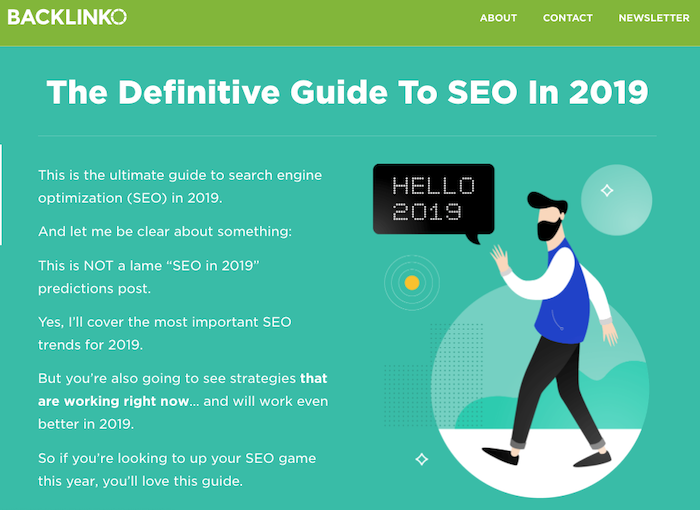
Often, these informational resources detail how small businesses can improve their search ranking using digital marketing strategies.
Although digital marketing strategies such as content marketing benefit SEO, these resources may not provide much detail about SEO’s fundamental technical elements.
“[Small businesses] get sold by Neil Patel or some of these other videos like SEMrush or Whiteboard Friday,” said John Vuong, Founder of Local SEO Search, a small business SEO company in Toronto. “These guys are marketers.”
Because these videos are marketing-focused, they may not detail the technical elements that search engines use to index a website's content.
Effective technical SEO makes it easier for search engines and online users to browse and understand your website content.
Examples of technical SEO factors include:
- Mobile-friendliness: Google indexes a website’s mobile version as its primary format, meaning that if your site is not optimized for mobile use, your search ranking can suffer.
- Page-load time: Slow page-load time hinders search engines from indexing all of your website’s content and may cause people to lose patience and quickly exit your site, which negatively impacts SEO.
- Navigation: The easier it is for search engines to navigate your website through following links between your pages, the easier they can understand your content. Intuitive navigation also creates a better user experience for site visitors.
- Site structure: An intuitive site structure signals which content to prioritize when search engines index your website.
Without context about technical SEO best practices, small businesses may develop a false sense of confidence about how well they understand SEO and their ability to structure and maintain their own strategy.
“Beyond ‘we’d like to rank for these handful of terms,’ there is rarely an actionable SEO strategy that addresses content, linking strategy, on-site technical SEO, or site speed,” said Wes Marsh, director of digital marketing for DigitalUs, a web design agency in Orlando.
SEO best practices refer to both helpful marketing strategies and technical optimization techniques that help a site rank in search engines. Small businesses that understand both are well-equipped to manage an SEO strategy.
Local Search and On-Site Optimization Help Small Business Follow SEO Best Practices
Small businesses’ SEO strategies focus on activities that achieve brand visibility but may not qualify as best practices.
Fewer than half of small businesses invest in local search optimization (45%) or on-site optimization (40%) as part of their SEO strategies.
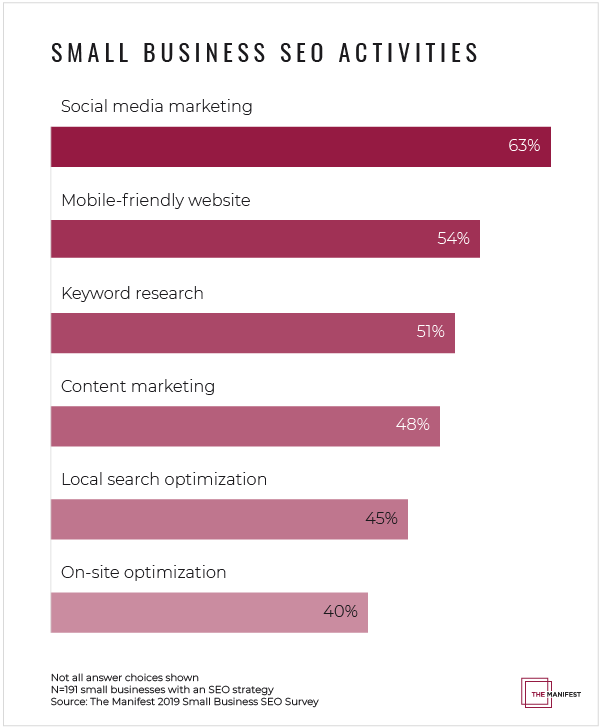
The most common SEO effort among small businesses is social media marketing (63%).
Social media has no direct impact on search rankings, though it helps small businesses boost brand awareness and engagement.
“Small business owners can often get their wires crossed when it comes to SEO strategies, usually mentioning things like social media,” said Ryan Scollon, an SEO and PPC freelancer. “While this all plays a big part as a brand, social media will not have any impact on your organic rankings.”
SEO services such as content marketing, on-site optimization, and local search optimization have a tangible impact on a small business’s search ranking.
For example, small businesses that focus on local search optimization can better engage local search audiences.
“If you are a small business that relies on local customers and clients, you need to create a local SEO strategy,” said Cory Hedgepeth, a senior digital marketing manager for Direct Online Marketing, a digital marketing company in Pittsburgh.
Small businesses that fail to take advantage of local search optimization sacrifice their eligibility for placement in a Google 3-Pack for relevant local search terms.
Google’s 3-pack is a box featured at the top of organic results on search engine results pages (SERPs) for local searches such as “cafes near me.”
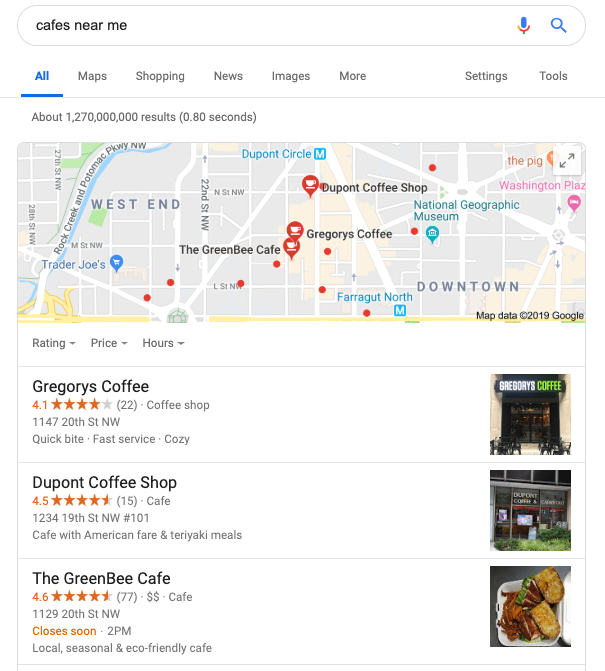
The placement of Google’s 3-pack toward the top of SERPs offers local small businesses a competitive advantage over larger, established market players because more than half of click-throughs on organic results go to the top 3 results.
Location is the main factor Google considers for local 3-packs, so small businesses that clarify their location through local SEO efforts increase their chances of earning a spot in a 3-pack.
Other beneficial local SEO services include:
- Google My Business (GMB) profile: Claiming a GMB profile ensures that Google recognizes your small business's existence and considers it for relevant search terms. A GMB profile is required to be featured on a Google 3-pack.
- Citations: Using the same information for your company’s citations online, for example, in local directories, ensures accurate information is displayed about your small business. Citation volume and consistency improve search ranking since search engines can be confident your website is an accurate source.
Small businesses that include local search optimization in their SEO strategies follow best practices for engaging local customers through search.
In-House Staff Provide Support for Small Businesses’ SEO but May Not Understand Best Practices
Small businesses primarily rely on in-house staff for their SEO strategies.

In-house staff can support some small business SEO activities but may not have the expertise to handle activities that make a long-term impact on a small business’s search rankings.
“If businesses aren't familiar with SEO, they could easily underestimate the knowledge and manpower required to do it well,” said Balazs Hajde, content manager for Authority Hacker, an online marketing education platform. “They might think hiring one or two multitasking members to cover everything will give them the boost in rankings they need, which isn't entirely wrong, up to a certain point.”
In-house staff can handle services such as content marketing, which can help boost search rankings. In-house resources, though, may struggle to maintain all of the services important to small business SEO strategies, particularly if they are technical.
SEO Agencies Help Small Businesses Understand SEO Best Practices
Small businesses that partner with an SEO agency tend to focus on more SEO activities.
At least half include content marketing (56%), on-site optimization (54%), keyword research (54%), and local search optimization (50%) as part of their SEO strategies.
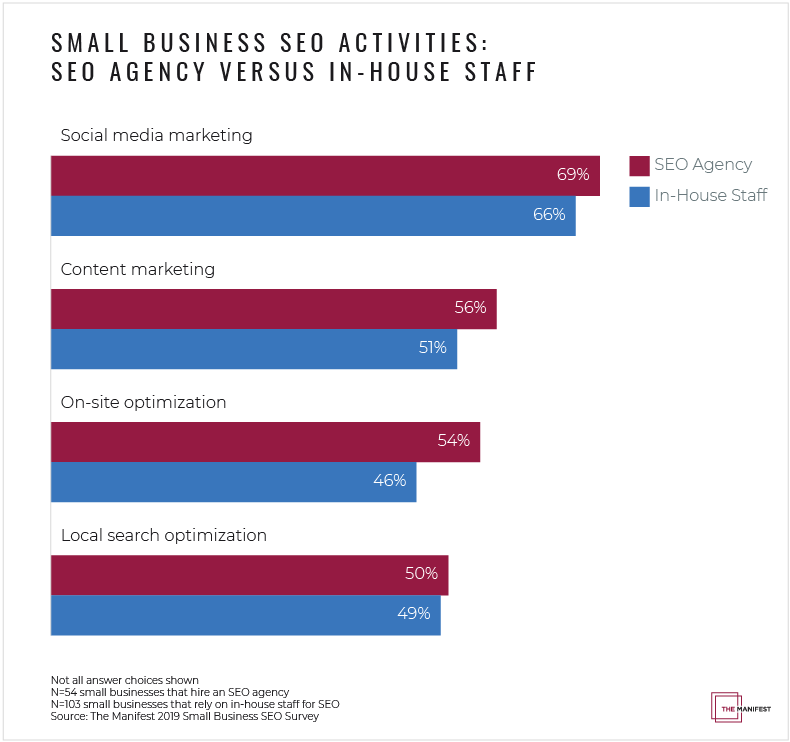
Small businesses that rely on in-house staff are slightly less likely to include these activities as part of their SEO strategies.
SEO agencies have expertise across multiple disciplines, which allows them to offer multiple SEO activities for small businesses.
“We have dedicated teams for content; we have dedicated technical teams for on-page,” Vuong said.
Partnering with an SEO agency, though, is a task that involves diligent research before making a decision.
Some small businesses have past negative experiences with or are wary of SEO companies. This leads them to rely on in-house staff they can trust, despite the potential knowledge gap of internal resources compared to an agency.
“A lot of business owners don’t know who to trust or who to turn to,” Vuong said. “They may look in-house.”
Vuong suggests that small businesses carefully review the quality of SEO companies by measuring how well they rank in search engines.
For example, if an SEO company can’t rank for its target keywords such as “SEO companies in New York,” it may indicate its inability to help your business rank for your target terms.
SEO agencies are valuable resources, and small businesses that diligently research companies to hire for help with SEO can benefit from their expertise.
Pay-Per-Click (PPC) Advertising Helps Small Businesses Refine SEO Best Practices
Investing in PPC advertising helps small businesses follow SEO best practices and increase their engagement with target customers through search.
More than three-fourths of small businesses (77%) that partner with an SEO agency invest in PPC advertising, compared to 62% of those that rely on in-house staff.

PPC allows small businesses to achieve immediate visibility in SERPs and understand the content that is most likely to engage their target audiences online.
With the data collected from PPC campaigns, small businesses can understand the exact topics, tone, and language that are most likely to drive clicks to their websites from search.
With this information, small businesses can better understand best practices for optimizing their on-site content for engagement, which in turn, improves search rankings.
Small Business SEO Activities, Resources Determine How Well They Understand Best Practices
Small businesses that invest in an SEO strategy are confident in their understanding of SEO best practices.
The activities that small business include in their SEO strategies, though, suggest that they may not fully understand SEO best practices.
Currently, social media marketing is the most common SEO activity for small businesses. Focusing on other SEO services such as local search and on-site optimization, however, helps small businesses reach local search audiences.
One reason small businesses may struggle to earn SEO success is their reliance on in-house staff for SEO services.
Hiring an SEO agency may help small businesses develop an SEO strategy that's more in-line with best practices. It’s important to approach the process of partnering with an SEO company with diligence, though. Still, small businesses that do partner with an SEO company implement more SEO services and are more likely to invest in PPC advertising.
About the Survey
The Manifest surveyed 529 small business owners and managers in the U.S. about their SEO investments and priorities in 2019.
More than half of small businesses surveyed (54%) had between 1-10 employees; 24% had 11-50 employees; 22% had more than 50 employees.
